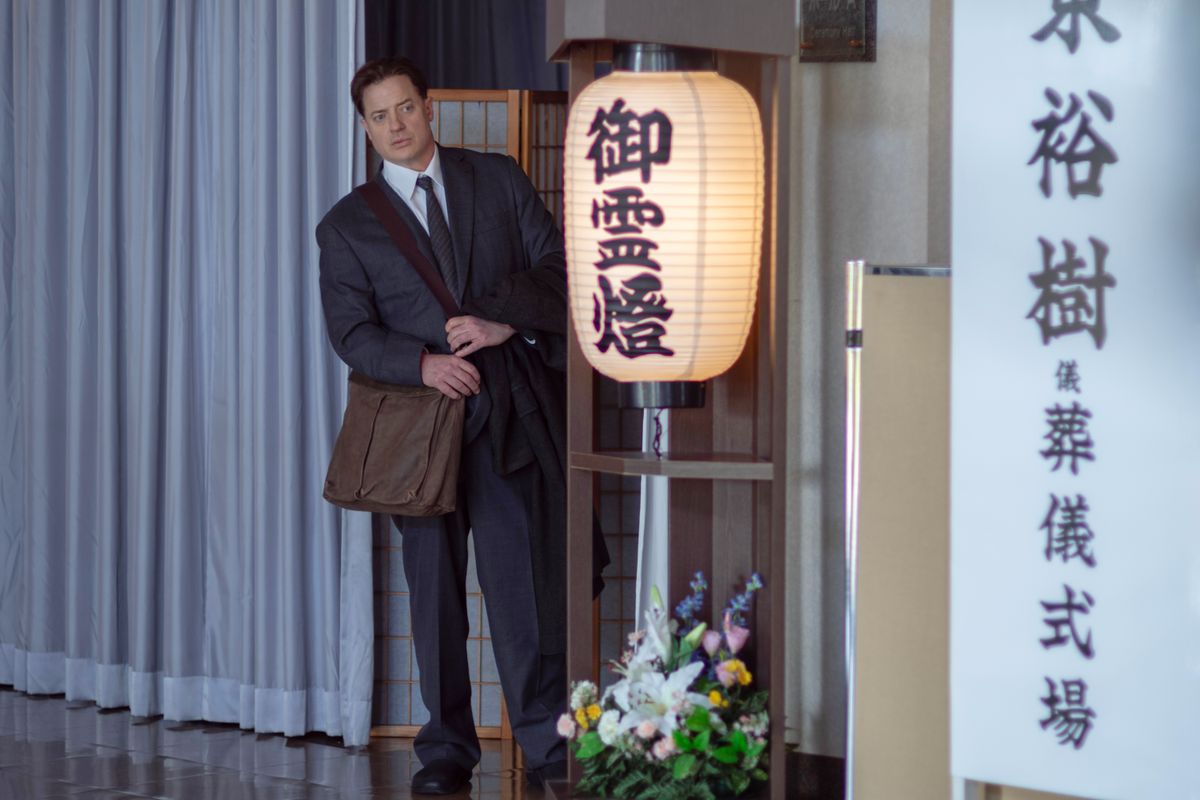It sounds rather like a mixed compliment to say of an actor that he’s persuasive at playing, well, a mediocre actor.
But then, this is Brendan Fraser we’re talking about. The man seems to become more emphatically human with each role, each passing year, each new wrinkle. And what’s more human, or at least more vulnerable and relatable, than mediocrity?
It is this essential vulnerability that keeps Fraser’s latest venture, filmmaker Hikari’s Tokyo-set “Rental Family,” from inching over that thin line between heartwarming and totally sappy.
Certainly the film has a fascinating premise, one that would have worked well enough were it totally fictional — but works better with the knowledge that it’s based on fact. There are, indeed, companies in Japan like the one at the center of Hikari’s film — businesses that “rent out” actors to play roles in people’s everyday lives.
In “Rental Family,” these actors play lovers, parents, friends, admirers, people to cry at a funeral or cheer at a karaoke bar — whatever a client needs to address whatever they’re missing. There are scenarios that raise definite moral questions. But these companies do offer something basic and essential: human connection.
Fraser’s Phillip Vandarpleog, too, is looking for connection, not to mention gainful employment. This middle-aged — and middling — actor originally came to Tokyo to star in a big toothpaste commercial. But that was seven years ago, and acting gigs have dried up.
As good as Fraser is at radiating humanity, he’s maybe even better at projecting discomfort — within his own skin, and within his large frame. And that’s what’s striking as we first meet Phillip, rushing to catch the subway, looking and feeling so different from everyone else.
After yet another fruitless audition, he makes his way home to a dark apartment where he eats takeout and gazes out into other apartments where people are living their lives, together.
Soon his agent calls with a quick gig: he needs a dark suit, and the role is “sad American.” He finds himself not at a shoot but at a funeral. That’s strange enough, even before the man in the coffin lifts his head and reacts to one of the loving eulogies.
Turns out everyone’s an actor, hired by the man to remind him his existence is worthwhile. The head of the rental company, Shinji (Takehiro Hira) tells Phillip to come by the office. There, he explains what they do. “You sell people!” Phillip exclaims. “We sell emotion,” Shinji counters. He further explains that mental health issues are stigmatized in Japan, and therapy thus not always a viable option.
A reluctant Phillip takes on a new assignment: In an elaborate wedding (beautifully rendered by director Hikari), he plays a groom, fooling the bride’s parents and family. At first he almost botches the job by hiding in the bathroom, mortified.
Soon, though, he’s a regular. There’s even a cute montage of his various “rental” gigs. In these transactional relationships, everyone seems to be getting what they want. But then two new jobs come up that will expose the moral complications of this line of work.
One involves an aging movie star (Akira Emoto, poignant) who’s fast losing his memory. His daughter hires Phillip to pose as a journalist and document his life. Things get dicey when the man begs Phillip to travel secretly with him to another town on an unexplained mission — expressly against the daughter’s wishes.
Then there’s Mia. The young girl’s single mother hires Phillip to pose as Mia’s long-absent father during the admissions process for an exclusive school, so they can present as a two-parent family.
The catch: Mia needs to believe the story to act truthful, so she can’t know Phillip is an actor. They will need to spend some bonding time together.
It’s not difficult to see where this is going. Of course, Mia (charming 11-year-old newcomer Shannin Mahina Gorman), initially reticent, will come to love the dad she didn’t know she had. Of course, Phillip will develop feelings as well. Their bonding scenes, in art class and at a street carnival, pop with gorgeous color; Phillip’s life is literally becoming brighter. (Hikari, who co-wrote with Stephen Blahut, excels at these beautiful urban scenes, which may have many checking airfares to Tokyo.)
But the ruse strains credulity. Honestly, is this a way anyone with a brain would treat a young girl? Trick her into thinking she has a father, only to cause pain when she learns he’s not?
The film will try to put a neat bow on this subplot by the end, along with a few other twists and turns along the way.
Some of these moments land more successfully than others. It’s not clear, though, exactly how we’re supposed to feel about the whole “rental family” phenomenon. In some ways, people get what they want and nobody gets hurt — like that bride at the beginning, who can now go off and live with the love of her life, her girlfriend.
But other scenarios are fuzzier, and the broader message may simply be that genuine connection, that holy grail we all crave, can sometimes be found in the oddest of places — even in a bizarre no man’s land between fake relationships and real ones.
“Rental Family,” a Searchlight Pictures release, has been rated PG-13 “for thematic elements, some strong language, and suggestive material.” Running time: 103 minutes. Two and a half stars out of four.
By JOCELYN NOVECK
AP National Writer





